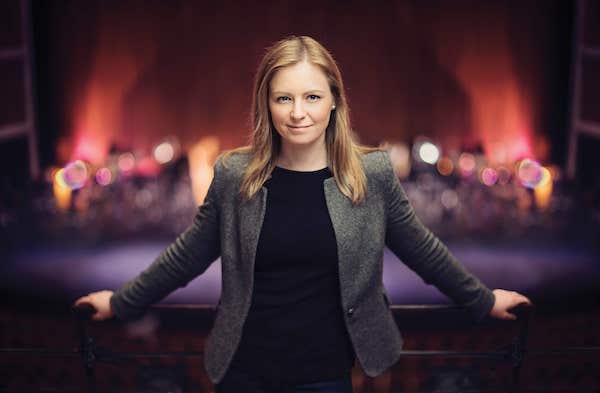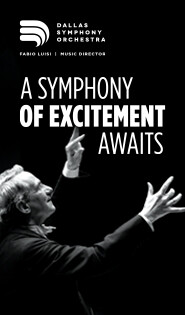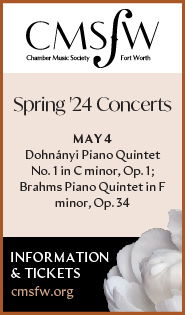Gemma New charts a promising course in Dallas Symphony debut

With a newcomer at the helm, the Dallas Symphony Orchestra set out in a markedly different direction — at least for one weekend. Whatever the future may hold, New Zealander Gemma New made an encouraging debut as principal guest conductor Friday night at Meyerson Symphony Center, and alongside the orchestra delivered a cleverly organized set of pieces that emphasized sonority over narrative.
This weekend’s program features two inventive and atypical premieres framed by two imaginative impressionist works from Claude Debussy. The first on Friday was Debussy’s Prélude à l’après-midi d’un faune, a beautifully colored tone poem based on an 1876 poem by Stéphane Mallarmé. It commenced with a sinuous flute solo, smartly played by David Buck, and the melody’s descending tritones blended into a warm cascading of harp to establish Debussy’s fanciful soundscape.
The 10-minute piece was replete with slivers of melody in solo bassoon, French horn, and oboe, all aptly performed. The orchestra was balanced in tone, with New’s conducting providing tasteful swells throughout.
The world premiere of A Different Drummer, Steven Mackey’s timpani concerto, was a highlight of the evening — and a promising sign for an orchestra willing to let a guest conductor lead it away from its wheelhouse. The 22-minute work, set in six contiguous movements, was a panoply of bizarre orchestral textures, with strings stroking eerily high on the E for starters and warbling dissonance in the harp.
The piece calls for dizzying rhythmic variations throughout each section of the orchestra. The closest thing it had to a tonal center was featured soloist Brian Jones, on a set of four timpani, displaying the unique virtuosity and versatility of the instrument through unsettling pitch bending. Jones’s wide range of dynamics and tonal colors pounded against discordant horns and percussion until a final movement that ended in a bright exclamation, complete with buzzy drum rolls on snares.
New Zealand born composer Salina Fisher’s Rainphase, having its Texas premiere, was just as unusual, but with a centering theme of nature. Inspired by wind and rain, it captures both through artful manipulation of instruments. The winds removed their mouthpieces to simulate the soft layers of a rushing breeze. The strings bounced the backs of their bows against strings to create a cumulative rainfall effect. New lead the orchestra with a thoughtful understanding of her countrywoman’s score, accenting thematic textures and layering effects convincingly. It was wholly effective, soft and supple in its delivery and indeed true to its inspirational source.
For the evening’s closer, Debussy’s orchestral masterwork, La Mer, New’s vibrant articulations and careful handling of textures provided an inspired reading. The three movements, subtitled Trois esquisses symphoniques (Three symphonic sketches), resemble the conventional ideals of symphonic writing, with the first movement highlighting two main themes, the second borrowing its form from the scherzo, and the third set in a rondo.
Debussy’s brilliant nautical opus still thrills with its innovative stylizations that lean more on color, mood, and atmosphere than on drama or realism. The work relies heavily for its effectiveness on the conductor, who must draw out dynamic changes through multiple shifts in rhythm and tempo, and sudden explosions in volume. Here, New’s left hand was appropriately animated and sensitive as the orchestra filled in the work’s complement of impressionistic lines.
The first movement, “From Dawn to Noon on the Sea,” opened with a thick, heavy darkness in the strings that expanded into bright, open horns, evoking images of a sunrise on the water. The orchestra’s tight cohesion gave the livelier second movement, “Play of the Waves,” color and depth, with particularly spirited phrasing in the woodwind section. “Dialogue of the Wind and the Sea,” the third and final movement, was marked with violent cymbal crashes and smooth trade-offs between strings, horns, and winds until ending triumphantly on a strong D-flat chord.
The program repeats 7:30 p.m. Saturday and 2:30 p.m. Sunday at the Meyerson. mydso.com; 214-305-6217


